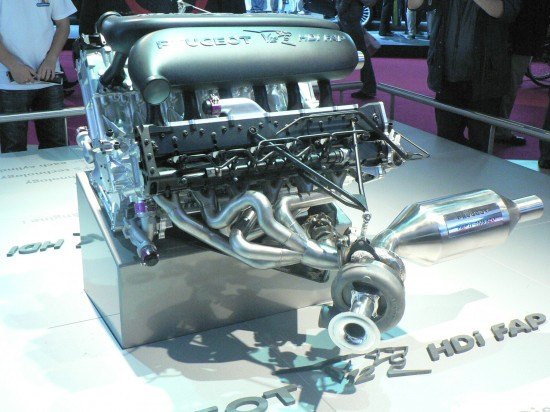France Hikes Taxes On Diesel Fuel, Auto Makers Protest
The French government is planning on raising taxes on diesel fuel, branding it a “health issue”, much to the chagrin of consumers and the country’s auto industry.
France’s environment minister, Delphine Bartho, told French radio ( via Bloomberg) that a study by the WHO showed that diesel fumes presented a significant health hazard, and the French government would move to raise taxes on the fuel to help soften demand.
“It’s inescapable,” Batho told RMC radio today when asked whether lower taxes paid on diesel compared with gasoline should be eliminated. “I am favorable. It’s a public health issue.”
Currently, diesel is about 20 cents cheaper per liter than gasoline, but France’s new tax regimen would bring diesel costs in line with gasoline. Originally, diesel was taxed at a favorable rate due to its use in farm equipment and heavy-duty vehicles, but the lower cost led to a massive shift towards diesel powered passenger cars. 73 percent of cars sold in France last year came with a diesel engine, compared to 55 percent on average in Western Europe.
Renault and PSA have been less than enthused with the new tax hikes. PSA is one of the world’s largest producers of diesel engines, and had criticized the studies cited by the French government, with PSA’s Director of R&D, William Faury, stating that they ignored modern particulate-filter diesel engines in favor of old-style engines.
The problem is not the diesel engines on sale now, but the pre-filter era diesels. Current Euro 5 standards for diesel engines are exceedingly tough, and PSA already has diesel powered models capable of emitting a Prius-like 100 grams of CO2 per km. PSA’s aggregate CO2 emissions level for its fleet of cars is already the lowest in Europe, at 122.5 grams per kilometer, just ahead of Toyota. And thanks to the upcoming Euro 6 emissions standards, that number should fall, as diesel NOx emissions are required to be aligned with those of gasoline engines.
While the government may be genuinely concerned about the health of its citizens, it’s hard not to see this as another cynical political calculation, similar to the now shelved plans for extremely high tax rates on France’s top earners. A hallmark of ineffective government is the use of dramatic, headline grabbing solutions, which are little more than PR stunts and rarely mistaken for solid governance. Despite the posturing of France’s current administration. A La Tribune columnist noted that the Environment minister herself admitted that diesel engines from a decade prior are the real problem, since they can emit as much as 30 times more pollution than the current crop of diesels.
To add to the matter, both PSA and Renault are in a precarious position. TTAC readers will know that the French government has been marshaled to help provide de facto bailouts to PSA and quell the ongoing labor disputes between the French auto makers and the myriad of unions entrenched in their factories. With Europe’s new car market already hanging by a thread, the diesel tax comes at a particularly bad time for France’s domestic auto industry.
More by Derek Kreindler
Latest Car Reviews
Read moreLatest Product Reviews
Read moreRecent Comments
- ToolGuy The only way this makes sense to me (still looking) is if it is tied to the realization that they have a capital issue (cash crunch) which is getting in the way of their plans.
- Jeff I do think this is a good thing. Teaching salespeople how to interact with the customer and teaching them some of the features and technical stuff of the vehicles is important.
- MKizzy If Tesla stops maintaining and expanding the Superchargers at current levels, imagine the chaos as more EV owners with high expectations visit crowded and no longer reliable Superchargers.It feels like at this point, Musk is nearly bored enough with Tesla and EVs in general to literally take his ball and going home.
- Incog99 I bought a brand new 4 on the floor 240SX coupe in 1989 in pearl green. I drove it almost 200k miles, put in a killer sound system and never wish I sold it. I graduated to an Infiniti Q45 next and that tank was amazing.
- CanadaCraig As an aside... you are so incredibly vulnerable as you're sitting there WAITING for you EV to charge. It freaks me out.


































Comments
Join the conversation
"The problem is not the diesel engines on sale now, but the pre-filter era diesels. Current Euro 5 standards for diesel engines are exceedingly tough, and PSA already has diesel powered models capable of emitting a Prius-like 100 grams of CO2 per km. PSA’s aggregate CO2 emissions level for its fleet of cars is already the lowest in Europe . . ." CO2 emissions are irrelevant. What is the difference in particulate emissions?
@rpn453 This got me thinking, I do realise diesels emit particulates. In Melbourne the particulate count is higher than Sydney due to human activity. Now Melbourne has significantly less rainfall than Sydney. How many particulates are "natural dust" and are lifted by traffic? A similar senario for Paris, except Paris is very developed with little open space (greenery) compared to an Australian city for the particulates to leech back into the ground. More traffic equals more particulates even if they didn't originate from a vehicle.